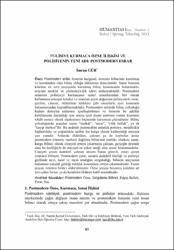| dc.contributor.author | Gür, İmran | |
| dc.date.accessioned | 2017-06-01T11:01:04Z | |
| dc.date.available | 2017-06-01T11:01:04Z | |
| dc.date.issued | 2013 | |
| dc.identifier.uri | https://hdl.handle.net/20.500.11776/1254 | |
| dc.description.abstract | Postmodern anlatı öznenin kurgusal, öznenin bilincinin kurulmuş ve kurulmakta olan bilinç olduğu iddiasının deneyimidir. Sanat öznenin kendine ait sırrı arayışında kurulmuş bilinç konumunda bulunmakta, arayışta tanıklık ve çözümleyicilik işlevi üstlenmektedir. Postmodern anlatının polisiyeyi kurmacanın temel unsurlarından biri olarak kullanması arayışın kendisi ve aranılan şeyin doğasının polisiyedeki esrar, gerilim, cinayet, öldürülme tehlikesi gibi unsurlarla aynı konumda bulunmasından kaynaklanmaktadır. Postmodern anlatıda bilinç yolculuğu kişinin deneyim anlarının içselleştirilmesi ve öznenin bu şekilde kurulmasına dayandığı için arayış içeri dışarı sınırının roman kişisinde tehdit unsuru olarak algılanması biçiminde karşımıza çıkmaktadır. Bilinç yolculuğunda aranılan unsur “mutlak”, “esrar”, “yitik bellek”, ya da “kayıp merkez”dir. Bu nedenle postmodern anlatıda polisiye, metafizikle bağlantılıdır ve çoğunlukla tarihin üst kurgu olarak kullanıldığı arayışla yan yanadır. Anlatıda öldürülen, çalınan ya da kaybolan unsur postmodern öznenin, merkezi dağılmış bilincinin mutlakı olurken; sanat, kurgu bilinci olarak cinayeti ortaya çıkarmaya çalışan, gerçeğin peşinde olan bu özelliğiyle de arayışın en yakın tanığı olan unsur konumundadır. Cinayeti çözen dedektif, çalınan unsuru bulan görevli, esrarı çözen izsürücü bilinçtir. Postmodern esrar, sanatın dedektif titizliği ve polisiye gerilimle neyi, nasıl ve niçin aradığını sorguladığı, bilincin arayışının tamamına karşılık geldiği tanıklık konumunu ortaya çıkarmaktadır. Esrarı arayan öznenin bilinci öldürülmüştür. Özne arayışı boyunca kendine ait sırrı çalan hırsızı ya da kendisini öldüren katili aramaktadır. | en_US |
| dc.description.abstract | Postmodern narration is the experience of the claim that the subject is fictional and the counsciousness of the subject is the consciousness that has been already establihed or yet being established. The art is situated in the position an estsblished consciousness in seking the mystery that belongs to itself and it assumes the function of attestation and analyticity in this seeking process. The reason of using detective narration by the postmodern narration as one of the essential elements of the fiction stems from the fact that the search itself and the nature of the searched thing is in the same situation with the factors, such as mystery, thrill, murder, danger of murder, etc. Since in postmodern narration, the voyage of conscience depends on internalization and establishing the subject in this way, the search appears to us as perception of the inside-outside border as a factor of threat, in the person of novel. In the voyage of consciousness the searched factor is “absolute”, or “mystery”, “lost memory”, or “the lost center”. For this reason, in postmodern narration, detective narration is related with metaphysic. In the narration, the killed, stolen, or lost factor becomes the absolute factor of the postmodern subject’s dispersed consciousness, while on the other hand the art is in the position of being the nearest witness of the search thanks to its characteristic of trying to reveal the case of murder and seeking the truth, as the fiction consciousness. The detective that reveals the mystery of the murder, the official that finds the stolen thing, and the detective that reveals the mystery, are consciousness. The postmodern mystery reveals the position of being witness that the consciousness fully corresponds with the whole of the search and the art inquires with the punctilio of a detective and with a detective thrill what is searched, how is searched and why is searched. The consciousness of the subject that seeks the mystery is killed. The subject, throughout its research, seeks the thief that stole a watch of him or the murderer that had murdered him. | en_US |
| dc.language.iso | tur | en_US |
| dc.publisher | Namık Kemal Üniversitesi, Fen-Edebiyat Fakültesi | en_US |
| dc.rights | info:eu-repo/semantics/openAccess | en_US |
| dc.subject | Postmodern Özne | en_US |
| dc.subject | Sorgulama Bilinci | en_US |
| dc.subject | Kayıp Bellek | en_US |
| dc.subject | Esrar | en_US |
| dc.subject | Suç | en_US |
| dc.subject | Postmodern Subject | en_US |
| dc.subject | conscience of inquiry | en_US |
| dc.subject | lost memory | en_US |
| dc.subject | mystery | en_US |
| dc.subject | crime | en_US |
| dc.title | POLİSİYE KURMACA ÖZNE İLİŞKİSİ VE POLİSİYENİN YENİ ADI: POSTMODERN ESRAR | en_US |
| dc.title.alternative | THE RELATIONSHIP OF DETECTIVE NARRATION, FICTION AND SUBJECT and THE NEW NAME OF DETECTIVE: POSTMODERN MYSTERY | en_US |
| dc.type | article | en_US |
| dc.relation.ispartof | HUMANITAS - Uluslararası Sosyal Bilimler Dergisi | en_US |
| dc.department | Fakülteler, Fen Edebiyat Fakültesi, Türk Dili ve Edebiyatı Bölümü | en_US |
| dc.authorid | 53669 | en_US |
| dc.identifier.volume | 1 | en_US |
| dc.identifier.issue | 1 | en_US |
| dc.identifier.startpage | 85 | en_US |
| dc.identifier.endpage | 101 | en_US |
| dc.relation.publicationcategory | Makale - Ulusal Hakemli Dergi - Kurum Öğretim Elemanı | en_US |



















